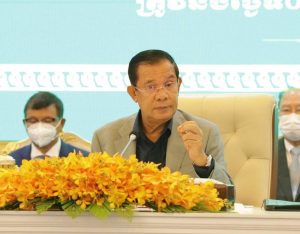Cambodia’s Prime Minister Hun Sen has admitted that his country’s attempt at oil extraction has failed, just eight months after the first drops of crude oil trickled from an offshore drilling platform operated by Singapore’s KrisEnergy.
Late last year, Hun Sen announced that Cambodia had fulfilled its long-cherished goal of extracting oil from its waters in the Gulf of Thailand. But in early June, KrisEnergy filed for liquidation, claiming that it was overburdened with debt.
“On December 29, we announced the first drop of oil – perhaps now it is a failure,” Hun Sen said in a speech Sunday, according to AFP.
When production began, KrisEnergy was forecasting a peak production rate of 7,500 barrels per day, but eventually fell far short of that goal.” In the end, there were 1,000 barrels pumped out a day,” the Cambodian leader said. “And now the company is bankrupt.” Hun Sen also claimed – somewhat cryptically – that KrisEnergy “ran away with the oil,” though he did not provide any further clarification.
According to reports in industry trade publications, KrisEnergy had long been in financial difficulties, and was relying on returns from the Cambodian oil field to save it from liquidation, but its projections were described by industry insiders as “wildly optimistic.”
The failure will no doubt come as a heavy blow for Hun Sen and the Cambodian People’s Party (CPP), for whom oil production has long had a symbolic importance out of proportion to its economic benefit. This was seen in the government’s decision to announce its first extraction of crude on December 29, the 22nd anniversary of the end of Cambodia’s long-running civil war, a choice that suggested that the two events were on the same plane.
Then, in early June, just a few days after KrisEnergy filed for bankruptcy, the government held a ceremony to install the first drop of oil extracted by the Singaporean company at the Win-Win Monument outside the capital Phnom Penh. On the occasion, Defense Minister Tea Banh described the extraction of oil as “an important first step for the country to build national capacity and its oil, gas, and energy industry.”
Cambodia has attempted to exploit offshore oil and gas deposits since the 1990s, so far with no success. In 2017, the Cambodian government formed a joint venture with KrisEnergy to develop more than 3,000 square kilometers known as Block A, with production initially scheduled to begin in 2019. The block had formerly been held by the U.S. oil giant Chevron, which sold its stake to KrisEnergy in 2014, after failing to reach a revenue sharing agreement with the government.
Had the offshore block fulfilled expectations, the CPP government would have received a source of income that would have reduced its reliance on Western development partners and further strengthened its hold on power. But as I noted in June, given the vanishingly small chance that revenues from oil would have benefited the majority of the Cambodian public, the collapse is unlikely to have much impact on ordinary people.
However, it does mark a significant loss of prestige for the Cambodian government, which in its eagerness to get oil production started, perhaps entered into the deal without completing the necessary due diligence. It is therefore perhaps not surprising to hear other reports that the Cambodian government may soon engage in the face-saving exercise of suing the Singaporean firm for the collapse of the oil venture.

































